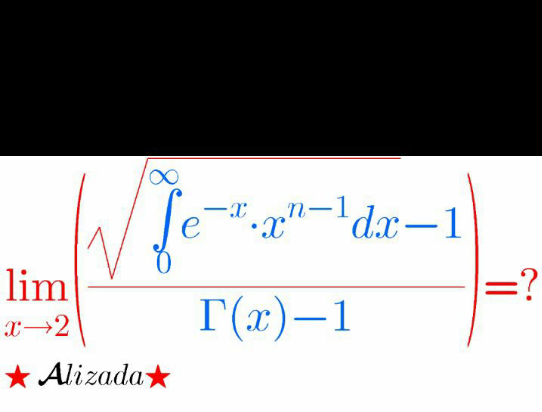
AllQuestion and Answers: Page 768
Question Number 143122 Answers: 0 Comments: 0
Question Number 143114 Answers: 1 Comments: 0
Question Number 143113 Answers: 0 Comments: 1
Question Number 143109 Answers: 3 Comments: 1

Question Number 143105 Answers: 0 Comments: 1
$$\frac{{cos}\left(\mathrm{3}{x}\right)}{{sin}\left(\mathrm{2}{x}\right)}\:=\:\mathrm{0} \\ $$
Question Number 143102 Answers: 1 Comments: 0

Question Number 143101 Answers: 0 Comments: 0
Question Number 143100 Answers: 5 Comments: 0
Question Number 143098 Answers: 1 Comments: 0
Question Number 143097 Answers: 1 Comments: 0
Question Number 143094 Answers: 1 Comments: 0

Question Number 143090 Answers: 0 Comments: 0

Question Number 143087 Answers: 2 Comments: 0

Question Number 143086 Answers: 2 Comments: 0
Question Number 143085 Answers: 0 Comments: 0
Question Number 143083 Answers: 1 Comments: 0
Question Number 143082 Answers: 2 Comments: 0
Question Number 143081 Answers: 2 Comments: 0
$${calculate}\:\int_{\mathrm{0}} ^{\infty} {xe}^{−{x}^{\mathrm{2}} } {arctanx}\:{dx} \\ $$
Question Number 143080 Answers: 2 Comments: 0
Question Number 143077 Answers: 1 Comments: 0
$${sin}^{\mathrm{5}} {x}\:+\:{cos}^{\mathrm{5}} {x}\:=\:\mathrm{2}\:−\:{sin}^{\mathrm{4}} {x} \\ $$
Question Number 143072 Answers: 1 Comments: 0

Question Number 143071 Answers: 2 Comments: 0
$$\int_{\mathrm{0}} ^{\frac{\pi}{\mathrm{4}}} \frac{\mathrm{8}{dx}}{{tgx}+\mathrm{1}} \\ $$
Question Number 143064 Answers: 4 Comments: 0
Question Number 143063 Answers: 0 Comments: 0
Question Number 143057 Answers: 1 Comments: 0
Question Number 143048 Answers: 1 Comments: 0

Pg 763 Pg 764 Pg 765 Pg 766 Pg 767 Pg 768 Pg 769 Pg 770 Pg 771 Pg 772
